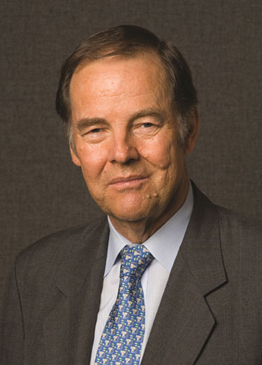Thomas H. Kean

The Honorable Thomas Howard Kean, 48th Governor of New Jersey, was born in 1935 in New York City into a family with a long history of public service. He is a descendant of New Jersey's first governor and delegate to the Continental Congress, William Livingston. His father represented New Jersey's 12th district in the U.S. House of Representatives.
Kean earned a Bachelor of Arts in History from Princeton University, and a Master of Arts in History from Teachers College, Columbia University. He taught history at St. Mark's School before being elected to the New Jersey Assembly in 1967 and the position of Governor from 1982 to 1990.
Governor Kean was a lifelong Republican, but was often described by the press as a "moderate" or even "liberal" Republican, who strongly supported environmental efforts and was highly committed to improving education in New Jersey's low-income school districts. He is celebrated for his bipartisan style, which he outlined in his book, The Politics of Inclusion. During his time as governor, he was able to bridge the parties and pass significant pieces of legislation.
Kean was rated among America's most effective state leaders by Newsweek magazine, noted for tax cuts that spurred 750,000 new jobs, a federally replicated welfare reform program, landmark environmental policies, and more than 30 education reforms.
As a Republican governor, Kean's focus in addressing poverty was on state, rather than federal, programs—specifically through the educational system. As a former teacher, he believed strongly in the importance of education, particularly as a way to lift people out of poverty. As a state legislator, he had introduced the bill that resulted in the creation of the Educational Opportunity Fund and was a strong proponent of development, particularly in Camden. The REACH program, "Realizing Economic Achievement," which Kean had a hand in starting, provided training to help welfare recipients find jobs. He also allocated funds to expand services for victims of domestic violence in New Jersey.
In 1981, Governor Kean bucked the Washington administration and made a bold move against Apartheid. He signed a bill to divest New Jersey state pension funds, one of the largest pension funds in the country, of stock in companies that did business in South Africa under the Apartheid regime. Kean was both applauded and criticized across the country for this action, but his greatest affirmation came when Nelson Mandela and Bishop Tutu recognized his efforts.
By 1985, Kean was so popular that he won the gubernatorial election by the largest margin New Jersey had ever seen with 71% of the votes. He enjoyed the support of minorities and union officials throughout the state, and was endorsed by Coretta Scott King. In his second inaugural address, he said:
As we approach the new century, let our state be known by the freedom it gives to the best and the brightest, and the compassion it shows to the less fortunate…Let history record that whereas once there was talk of a North Jersey and a South Jersey, of rich suburbs and poor cities, we joined to heal those divisions. That hereafter our people spoke mainly of New Jersey, and that cities shone while suburbs thrived…Let our work here make it so that there is no difference between black unemployment and white unemployment, but instead a bounty of productive jobs for all who want them.
Upon leaving public office, Kean returned to education and held the position of President of Drew University from 1990 to 2005. He was named to President Bill Clinton's "One America in the 21st Century: The President's Initiative on Race" in 1997 and was appointed to head the National Commission on Terrorist Attacks Upon the United States, known as the "9/11 Commission" in 2002. He has served as a trustee of Princeton University and Columbia University and currently serves as Chairman of the Board of Carnegie Corporation of New York. In addition, he has served on a number of corporate boards, is Chair of the National Campaign to Prevent Teen and Unplanned Pregnancy, Co-chair of JerseyCan, and Vice Chairman of the Environmental Defense Fund. He serves on the Board of the Seeing Eye and is the former Chair of The Robert Wood Johnson Foundation, the nation's largest health philanthropy.
Governor Kean is recognized for his efforts to level the playing field in New Jersey and for his commitment to working in a bipartisan manner to benefit all.
AWARDS & RECOGNITIONS
2011 Frederick Heldring Global Leadership Award
2005 NAICU Award for Advocacy of Independent Higher Education
2005 Four Freedoms Award
NAACP Man of the Year
Freedom Foundation Heart of Gold Award
LD Access FoundationStatesman of our Decade
New Jersey Alliance for Action Lifetime Achievement Award
Building Bridges Award (Presented by Voices of September 11)
National Wildlife Federation Conservation Achievement Award
Christopher Reeve Foundation Visionary Leadership Award
American Institute for Public Service Jefferson Award for Public Service
Pilgrims of the United States Medallion of Service to the Nation
Woodrow Wilson Medal for Distinguished Service to Education